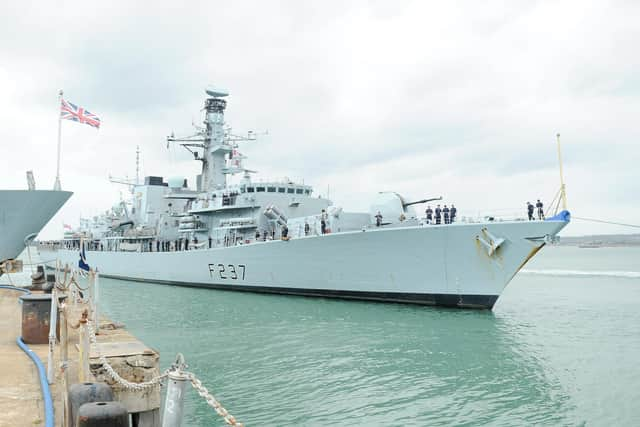Royal Navy: HMS Westminster to be decommissioned due to lack of sailors amid wait for Type 26s, reports say
and live on Freeview channel 276
According to the Daily Telegraph, HMS Westminster will be scrapped or sold to an ally despite the long-held plan to renovate the warship. Rumours have swirled for months about whether the Type 23 frigate, currently being held in Devonport, Plymouth, would ever be back on the open sea.
Claims of her poor condition and the economic viability of a full restoration project were considered stumbling blocks to the process. HMS Westminster had a refit in 2017, and was due to undergo another £100m refurb. The Daily Telegraph said HMS Argyll will join in HMS Westminster in being put out of service due to the lack of sailors at the Royal Navy’s disposal.
Advertisement
Hide AdAdvertisement
Hide Ad

A defence source told the national publication: “We will have to take manpower from one area of the Navy in order to put into a new area of the force.” A Whitehall source added that the new ships will be ready before the Type 23 frigates would be refitted. “It is always emotive when ships that have a long history of service come to the end of their working life," they said.
“They and the sailors who crewed them have done the country proud. But decommissioning them is the right decision.” Personnel will be allocated to the new fleet of eight Type 26 frigates, but the first of these vessels – HMS Glasgow – is not due to be up and running until 2028. HMS Cardiff is expected to be ready by 2030, but the others are even further away.
The new submarine-hunting ships are being constructed as part of a modernisation programme, and will be the Royal Navy’s most advanced ships to date – complete with 3D surveillance radar, a Sea Ceptor missile system and other features to deal with underwater vessels and high-intensity air defence scenarios.


The loss of HMS Westminster and Argyll would bring the force’s current number of frigates down to nine until the first new Type 26s are commissioned. Given the current aggression by Iranian-basked Houthi rebels in Yemen against merchant vessels in the Red Sea, critics are perplexed by the decision. They believe Britain would be able to offer more security if the navy had a larger fleet. HMS Diamond is currently deployed in the area as part of Operation Prosperity Guardian, but the government currently have no plans for further vessels to join her.
Advertisement
Hide AdAdvertisement
Hide AdLord West, the former first sea lord, said the UK’s fleet is “dropping like flies” and the loss of operational ships is only a good idea if no war is expected in the next few years. Shadow defence secretary John Healey said mothballing ships shortly after refits has cost the taxpayers’ millions and pounds and added that mismanagement from the Ministry of Defence has “plunged to new lows”.
A Royal Navy spokesman said: “The operational requirements of the Royal Navy are kept under constant review. The Ministry of Defence is committed to ensuring the Royal Navy has the capabilities it needs to meet current and future operational requirements.”